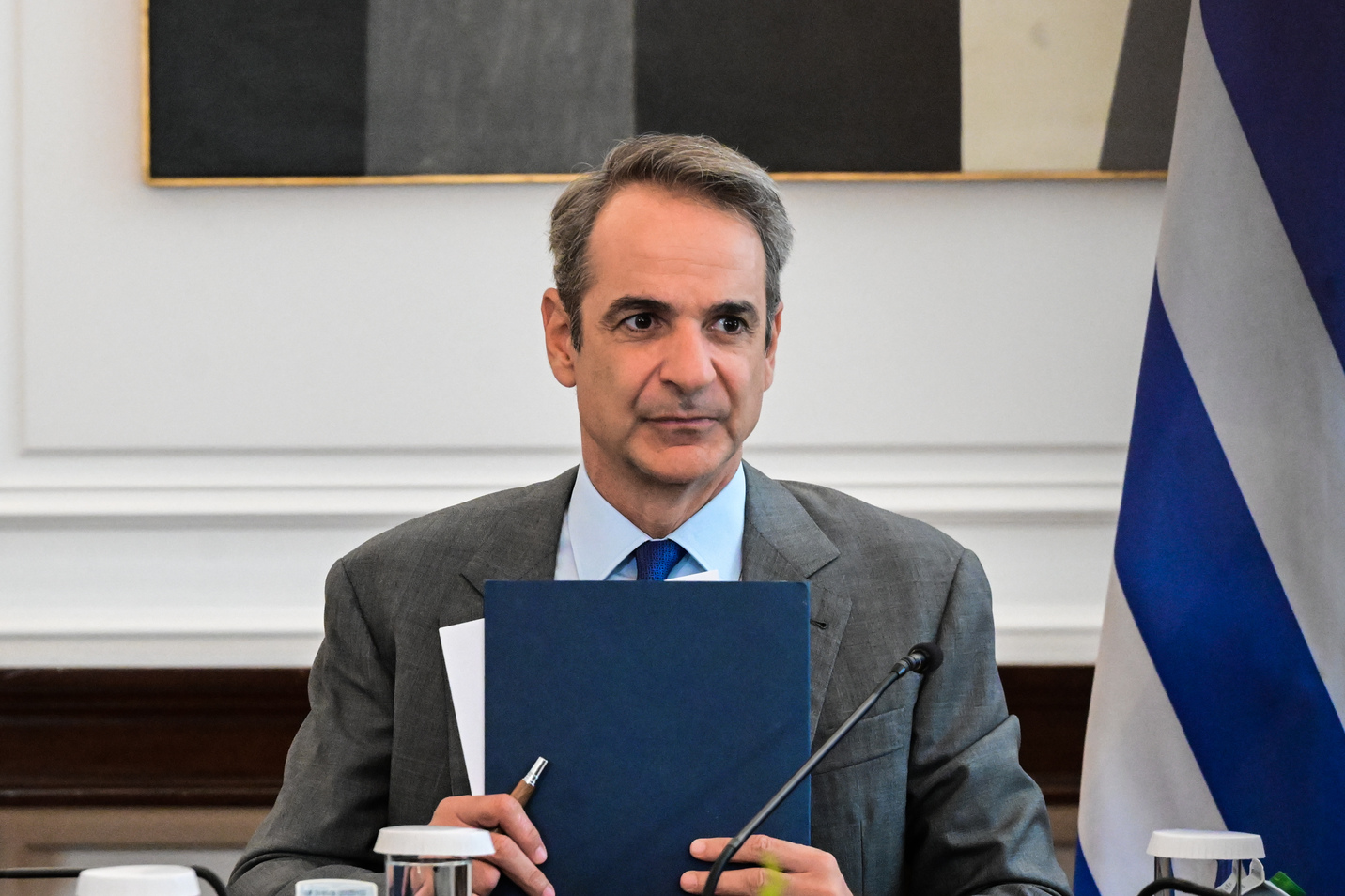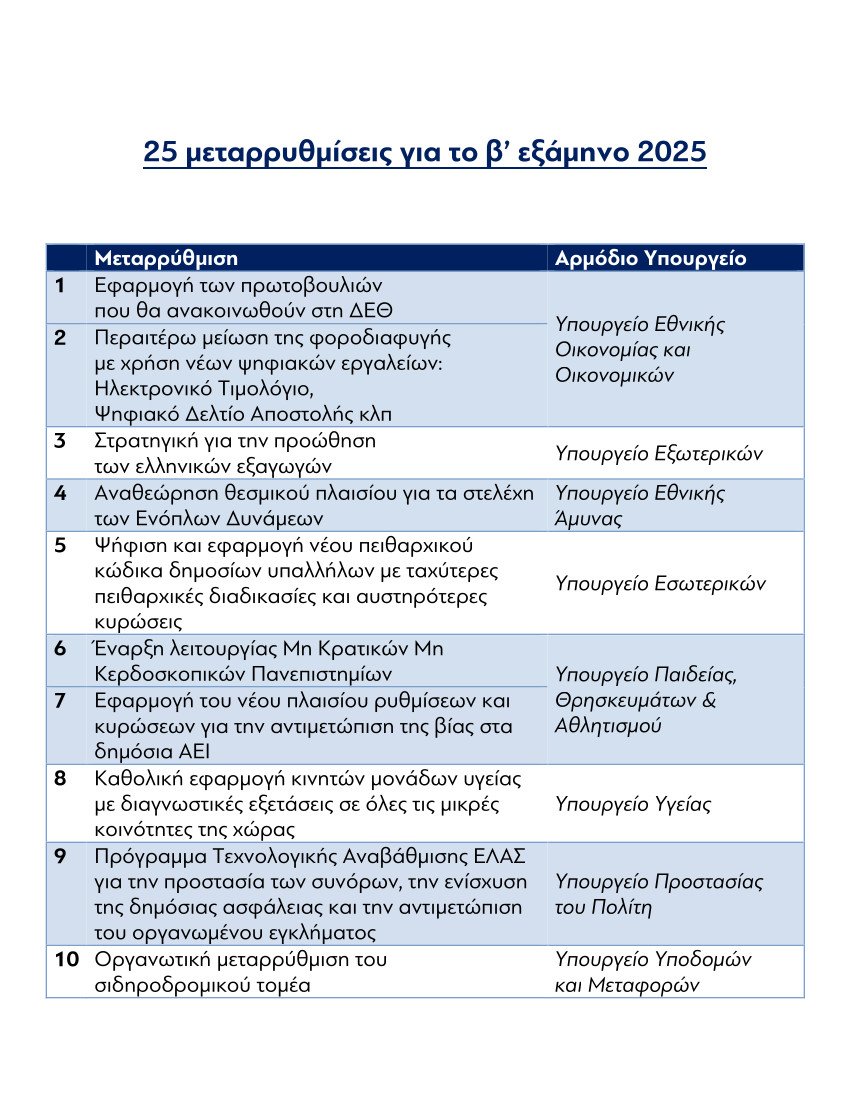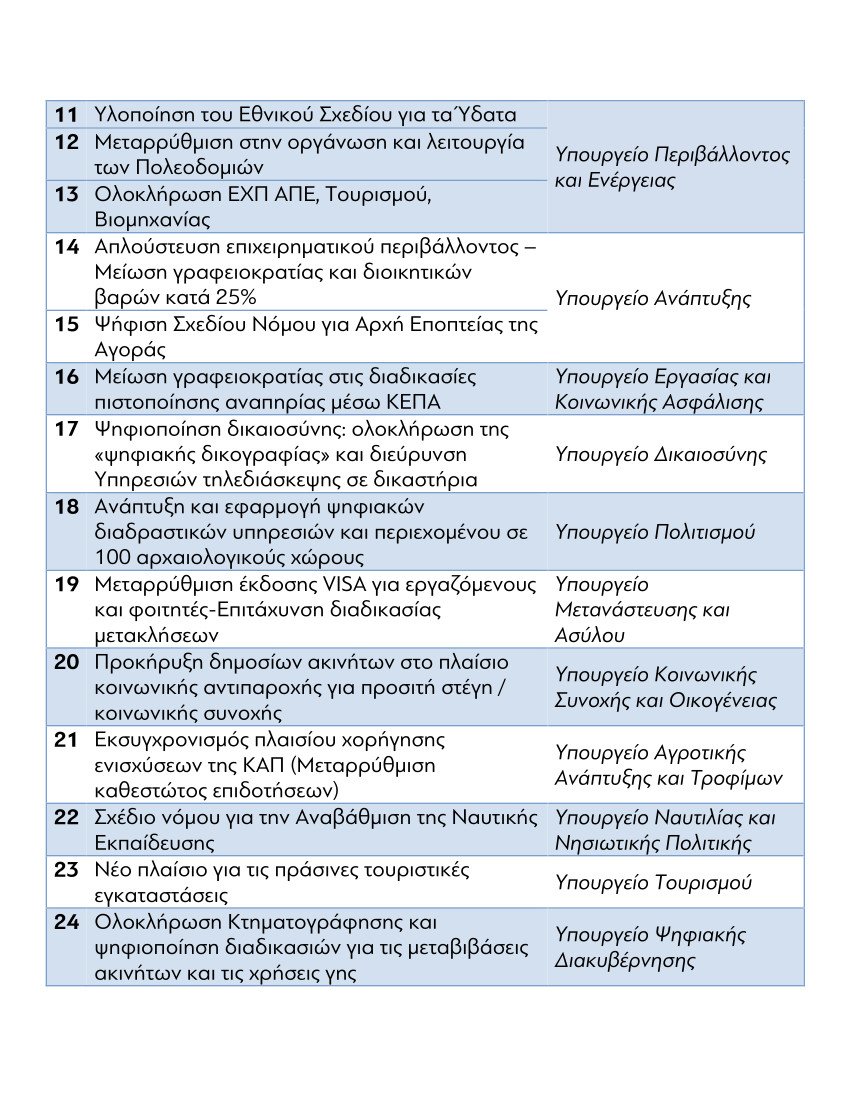Further reduction of tax evasion through new digital tools, revision of the institutional framework for Armed Forces personnel, implementation of a new disciplinary code for public employees, launch of non-state non-profit universities, modernization of the CAP subsidies framework, and digitization of property transfer procedures were the focus of Prime Minister Kyriakos Mitsotakis at the cabinet meeting, as 25 reforms that the government has ahead of it until the end of the year were presented.
“I must say that we need to have a sense of the importance of adhering to timelines – this is a horizontal policy direction – concerning the Recovery Fund, reforms and projects,” emphasized Mr. Mitsotakis, adding that 2026 “is an absolutely critical year for completing the Fund. You know well what the targets and timelines are and you know very well that the next 12 months will be absolutely decisive, so that not one euro is lost from resources we secured with great effort and tremendous work.”
The Prime Minister spoke about preparing measures to be announced at the Thessaloniki International Fair that will concern tax relief and support for the middle class. At the same time, Kyriakos Mitsotakis spoke about reducing tax evasion and bureaucracy, saying “the goal is for the state to become increasingly more effective.”
Mitsotakis: The 25 priorities until the end of the year
In his introductory speech, Kyriakos Mitsotakis emphasized among other things:
“We have significant bills to process, the Local Government Code comes to bring order, but today we will focus on 25 priorities until the end of the year.” The Prime Minister referred to a package of initiatives, making special mention of the Environment Minister, who has three priorities. “It’s easy to succumb to simple daily management, but it’s important to have charted an overall roadmap with an implementation horizon of the end of this year,” he noted.
Subsequently, and in view of the detailed presentation to be made by the Deputy Prime Minister, Kostis Hatzidakis, he highlighted some that he considers particularly important: Referring to the Finance Ministry, he noted that “it is preparing for announcements to be made at the Thessaloniki International Fair, but we insist on the battle against tax evasion,” while also referring to a very important effort together with the Development Ministry to reduce bureaucracy for businesses.
Referring to the Interior Ministry, he emphasized that it must complete the disciplinary code for public employees with strict penalties and with the speed of case processing in months instead of years. Referring to the Infrastructure and Transport Ministry, the Prime Minister noted that it will present this fall the first samples of what has been done with Greek railways.
Mitsotakis: Adherence to timelines critical for Recovery Fund, not one euro should be lost
“The Environment Ministry has three priorities,” said Kyriakos Mitsotakis:
“A drastic intervention in the way urban planning offices operate, an emblematic reform that will uproot sources of corruption and accelerate the issuance of building permits, while spatial planning schemes for industry and tourism will be ready by the end of the year. We will set a hard deadline for renewable energy planning. The national water management plan to address the crisis that came to stay. The timeline for its presentation will be after the Thessaloniki International Fair.
The Digital Governance Ministry will complete procedures for the Land Registry while the Social Cohesion and Family Ministry will present what is happening with social compensation.
I won’t expand on the initiatives, we must keep to the timelines, which is important for the Recovery Fund. The next 12 months are absolutely decisive, so that not one euro is lost from Recovery Fund resources,” he said.






Kyriakos Mitsotakis’ presentation at the Cabinet Meeting
“Good morning ladies and gentlemen colleagues. While most of our fellow citizens may be approaching the brief respite of August, we, as you well know, our pace doesn’t necessarily follow the summer schedule.
We are at the beginning of the second half of our term and this Cabinet Meeting will have a slightly different character compared to previous ones.
We obviously have significant bills to process, perhaps with the most emblematic being the Local Government Code, which brings order to chronic pathologies and overlapping competencies in local government issues and introduces a new interesting electoral system for the way our elected officials are chosen, first and second tier.
However, today we will focus a bit more on 25 priorities, basic reforms, which will form the core of our governmental work from now until the end of the year.
Essentially these are a package of initiatives. One, two, some Ministries – I’m looking at the Environment Minister – have three important priorities each, which must be implemented without delay, obviously in parallel with each Ministry’s ongoing policies.
It’s very easy, you know, to succumb to simple daily management and I know how heavy this is for each and every one individually, but it’s very important, at the Cabinet level, to have charted a roadmap with specific goals and prospects and with an implementation horizon of the end of this year.
I won’t refer to all these important reforms, the Deputy Prime Minister and Minister of State will present them, I’ll just highlight some which I consider particularly important.
The Finance Ministry is obviously preparing for announcements to be made at the Thessaloniki International Fair, new relief measures, middle class support, but we insist on the battle against tax evasion with new digital tools.
And of course, in combination with the Development Ministry, we’re starting a very important effort involving several competent Ministries, to reduce bureaucracy, especially for businesses, by 25%. And of course, intensifying market controls through the unified supervisory authority, our purpose is for the state to become continuously increasingly more effective.
The Interior Ministry must complete the revision of the public employees’ disciplinary code, which provides, as we have discussed, fast procedures and serious sanctions in case of errors against citizens and very rapid case processing, in months instead of many years, as unfortunately applies until today.
The Infrastructure and Transport Ministry will present, we hope this fall, the first new samples of the new Greek railways.
In the Environment Ministry, which I mentioned before, I identify three important priorities: one is a drastic intervention in the way Urban Planning offices operate. I believe this will be an emblematic reform, which will both uproot sources of local corruption, but will also accelerate the issuance of legal building permits.
An issue that must be completed – it doesn’t concern only the Environment Ministry, but also competent Ministries – is the special spatial planning for renewable energy sources, for industry and for tourism. There we will set a hard deadline. By the end of the year all three of these special spatial plans must be completed.
And of course, the National Water Management Plan to address a crisis which unfortunately has come to stay. The timeline for presenting this emblematic initiative will be immediately after the Thessaloniki International Fair, obviously with an implementation horizon that will be determined with great clarity.
The Digital Governance Ministry will complete procedures concerning the Land Registry. We have strict timelines there which we must keep.
The Social Cohesion and Family Ministry. We must see the first samples regarding social compensation.
And for the Health Ministry, which is implementing many actions, let me indicatively highlight initiatives regarding the progress of digital projects, but also Mobile Health Teams, so that free preventive examinations can reach every corner of our homeland.
I won’t expand much more on individual initiatives, because otherwise I’ll take over the Deputy Prime Minister and Minister’s presentation.
Let me also say that we must have a sense of the importance of adhering to timelines – this is a horizontal policy direction – concerning the Recovery Fund, reforms and projects.
2026 is an absolutely critical year for completing the Fund. You know well what the targets and timelines are and you know very well that the next 12 months will be absolutely decisive, so that not one euro is lost from resources we secured with great effort and tremendous work.
So, I’ll stop here with my introductory remarks, to give the floor to Kostis to discuss a bit more extensively the timeline of reforms we will implement within the next six months.”
*Read here the government’s 25 promoted reforms







